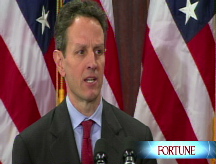The stock market isn't as bad as you think
Stocks are off to another dismal start this year. But unlike 2008, investors are finding some bargains -- a sign that the market may be slowly returning to normal.

 |
| The broader market has fallen nearly 10% already this year -- but a lot of that has to do with the truly abysmal performance of the banking sector. |
NEW YORK (CNNMoney.com) -- Happy Presidents' Day! Even if you have to work (like I do), the best part of this holiday is that the stock market is closed. And after last week, we all need a break.
The market tanked, with the S&P 500 falling 4.8%, putting it down 8.5% for the year. This despite a new bank bailout plan and the passage in Congress of the economic stimulus bill.
Still, there is a bit of good news
Unlike last year, much of the selling has been contained to shares in financial companies - the S&P Banking Index is down 46% so far this year.
In fact, 172 of the stocks in the S&P 500 are in positive territory.
That may not sound great. But in 2008, a mere 25 stocks finished in the black. It's promising to see that more than a third of S&P 500 stocks are holding up reasonably well.
It's not surprising that many of this year's winners are in defensive sectors, companies that should be able to fare okay during a recession.
Several healthcare stocks, for example, are among the market's leaders, such as managed-care provider Cigna (CI, Fortune 500), generic drug maker Mylan (MYL) and cardiovascular-device manufacturer St. Jude Medical (STJ).
There are also a handful of consumer-staples companies, i.e. firms that make everyday items like food, beverage and personal care products.
Shares of tobacco company Lorillard (LO), milk producer Dean Foods (DF, Fortune 500) and soft drink bottler Coca-Cola Enterprises (CCE, Fortune 500) are all up more than 10% this year.
But what you may not have realized is that shares of many more economically-sensitive companies that were pummeled last year have started to bounce back. That could be a sign that bargain hunters may be betting on an economic rebound later this year or in early 2010.
For example, shares of online retailer Amazon.com (AMZN, Fortune 500), which plummeted 45% in 2008, are up more than 23% so far this year. Other beaten down retailers, such as video-game seller GameStop (GME, Fortune 500) and grocery-store chain SuperValu (SVU, Fortune 500), are both up more than 20% in 2009.
A couple of brand name tech companies have also enjoyed a comeback: shares of Corning (GLW, Fortune 500), Google (GOOG, Fortune 500) and EMC (EMC, Fortune 500) are all up at least 15%. And according to fund tracker Morningstar, technology sector funds are up 2% year-to-date. The only other class of stock funds that have gained ground this year are healthcare funds.
Several companies in the oil patch have begun to recover as well -- despite a continued drop in crude prices.
Shares of Tesoro (TSO, Fortune 500), an oil and gas refiner, are up more than 40% this year following a 72% drop in 2008. Other beaten-down energy companies, such as oil-driller Noble (NE) and equipment provider National Oilwell Varco (NOV, Fortune 500), have also enjoyed double-digit percentage pops this year.
And even in the sector that everybody loves to hate -- finance -- there are a few standouts. Shares of Morgan Stanley (MS, Fortune 500) are up 43% while Wall Street rival Goldman Sachs (GS, Fortune 500) has gained 14%.
It's interesting that both stocks have rallied considering that shares of the other troubled big banks that received the first round of bailout money last fall, most notably Citigroup (C, Fortune 500) and Bank of America (BAC, Fortune 500), have continued to sink. Even "healthy" banks such as JPMorgan Chase (JPM, Fortune 500) and Wells Fargo (WFC, Fortune 500) have been hit hard.
So what's this all mean? Of course, this is not to suggest that the financial pain will be over anytime soon. As I pointed out two weeks ago, the banking sector has to be fixed first for there to be a sustainable recovery in the economy and stock market.
But the fact that investors are bidding up some stocks and not just dumping all equities in favor of safer havens like gold and Treasury bonds is somewhat encouraging.
The indiscriminate selling that was a hallmark of the market at the end of last year appears to be over...hopefully for good. ![]()


